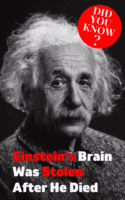“Imagination is more important than knowledge.”
This is a quote from Albert Einstein, a German-born theoretical physicist.
Sorry, Albert, it appears some people didn’t agree with you on this one. They didn’t just want to imagine what was in your brain, they wanted to know. And for this reason, they stole it when you died.
Who was Albert Einstein?
Albert Einstein was born into a Jewish family in Ulm, in the German Empire on 14 March 1879. When Einstein was 12 years old, he taught himself algebra and Euclidean geometry over a single summer. His father, Hermmann Einstein who was a salesman and an engineer, wanted the young Einstein to pursue a career in electrical engineering. Hermmann Einsten sent his 15 year old son to study at Luitpold Gymnasium.
However, Einstein did not get along with his teachers and resented his school’s teaching methods. He felt that the spirit of learning and creative thought was lost in the school’s strict memorisation technique.
Einstein convinced the school to let him go by producing a doctor’s note claiming nervous exhaustion. He then went to attend a special high school where he matriculated in 1896.
At the age of 17, Einstein enrolled at the Federal polytechnic school for four-year mathematics and physics teaching diploma. After graduating in 1900, he couldn’t get any academic position that he applied for. Some of his professors had alienated him from missing some of his classes because he preferred to study advanced subjects on his own.
In 1902, he eventually landed a job as a clerk at a Swiss patent office in Bern. In the same year his father passed away. In 1905, Einstein was awarded a PhD by the University of Zurich and by 1908 he was recognised as a leading scientist. He was appointed to lecture at the University of Bern.
In 1921, Einstein’s explanation of the photoelectric effect won him a Nobel Prize in physics. Einstein had many discoveries as a physicist but he is perhaps best known for the equation E = mc2 and his theory of relativity.
Why Einstein’s brain was stolen
Albert Einstein’s brain had attracted a lot of attention because of his reputation as one of the most prominent geniuses. Einstein didn’t want his brain to be studied and he didn’t want to be worshiped either. He wanted his remains to be cremated and his ashes scattered secretly.
Shortly after Einstein’s death in 1955 at the age of 76, Dr. Thomas Stoltz Harvey, a pathologist who conducted an autopsy on him removed his brain without the permission of Einstein’s family.
Hans, Albert Einstein’s son, was furious when he found out that the body of his father was not intact and his brain was removed. However, Harvey managed to convince him to grant permission for the brain to be studied with the hope that it would be of significant contribution to science history.
Harvey took Einstein’s brain to a lab at the University of Pennsylvania where he dissected it. He kept some pieces of the brain to himself while others were given to the leading pathologists. Harvey was fired from the hospital when the medical team found out about what he had done. His career declined and he spent two decades doing odd jobs.
Steven Levy, then a young journalist rediscovered Einstein’s brain in Harvey’s possession in 1978. He later published an article entitled, I Found Einstein’s Brain in the New Jersey Monthly.
In 1999, Harvey and Canadian collaborators wrote about the results of the studies of Einstein’s brain in one of the prestigious medical journals. The researchers claimed that Einstein’s parts of the parietal lobe, a part of the brain which is linked to mathematical ability, had an abnormal folding pattern.
Mutter Museum in Philadelphia acquired 46 small pieces of Einstein’s brain and in 2013, segments of the brain went on exhibit in the museum’s gallery.
***
Do you know what intelligence is? Read here to find out.
Tell us: Did you enjoy reading this article? Why or why not?


